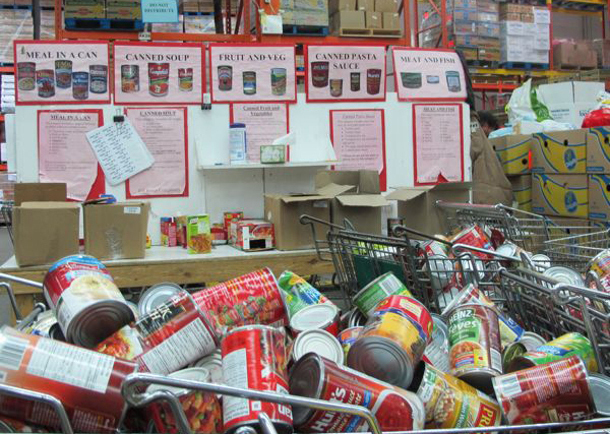Dear Premier Horgan,
A few days before Christmas, you tweeted, “Everyone needs a little help from time to time. This is a good time to get in touch with your local food bank to see what they need most,” and you provided the link to find local food banks.
Your advice as B.C. Premier and leader of the NDP deserves more than a tweeted response. It will not have passed your notice that since the late fall, the CBC, the private media, food banks, missions, churches, community groups and supermarkets have been busily raising funds and donations while feeding the hungry and homeless. All the while confirming domestic hunger as the downloaded business of charity, no longer a political responsibility, let alone obligation, of government.
Your tweet acknowledges food banks as an entrenched part of the B.C. welfare system modelled on U.S.-style corporate charity and wasted food. Yet we know food banks are a Band-Aid response to a broken social safety net. Hungry people need much more than a little help, not just at Christmas but year-round.
Certainly, at this time of festive food abundance your message encourages all to do their bit, expressing practical compassion and the moral imperative to feed the hungry in wealthy and “super unequal British Columbia.”
However, to what extent is referring people to food banks a message of solidarity with the half-million British Columbians who worry about or are struggling or unable to feed themselves and their families, of whom one in six are children? Moreover, these numbers exclude homeless and on-reserve First Nations people.
Alarmingly, these official B.C. figures are five years out of date. Why? The previous Liberal administration chose to opt out of national food insecurity data collection after 2012. Instead, the annual hunger counts of those turning to B.C. food banks (103,400 in 2016) become the accepted measure.
Yes, a shocking and unacceptable number, but still a considerable underestimate of food insecure British Columbians, as only one in four turn to food banks. The fear of stigma keeps many away. Many of those who do use food banks still remain hungry. And the majority of the food insecure are working poor, not only those dependent on inadequate income assistance benefits.
Unquestionably, the previous Liberal government has much to answer for. For a full decade, it failed to raise welfare benefits. Instead it saved our tax dollars by relying on corporately backed food charity using surplus food (edible food waste) to feed the hungry. Prior to the 2017 election it made a $10-million grant to B.C. food banks further institutionalizing systemic hunger and poverty as the responsibility of charity and the private sector.
Food banks became further entrenched as the secondary tier of the social welfare system, creating secondary food markets for secondary food consumers (also known as our fellow citizens). By opting out of nationally collected food insecurity data, the government ignored evidence-based public policy for addressing widespread hunger and poverty. Such shameful indifference indicated a moral vacuum at the heart of the former government.
Outsourcing hunger to charity enables government to look the other way, allowing us to believe that distributing “left-over” food to “left-behind” people is effective and morally defensible public policy. It is uncritical solidarity.
Edible corporate food waste is a symptom of a dysfunctional food industrial system, and hunger a symptom of broken social safety nets. There is no evidence that treating one symptom with another either reduces food waste or solves food insecurity.
Most concerning, Premier, your holiday tweet suggests that solidarity with the poor rests on your government’s support for the status quo of the B.C. charitable food bank system. Is this the best your new administration can do? As an anonymous commenter on a Tyee article on hunger in the Downtown Eastside noted, “We go on giving and giving but the problem remains.”
Surely U.S.-style corporate food banking introduced in 1982 to B.C. must be resisted. Are you choosing to leave systemic hunger to corporate charity? Food is a basic human need and fundamental human right, ratified by the federal government (with provincial support) as long ago as 1976. Government is the “primary duty bearer” to ‘“respect, protect and fulfill” the right to food.
The primary cause of hunger in B.C. (indeed throughout Canada and the rich, food-secure OECD world) is inequality and income poverty caused by unliveable wages, inadequate social security benefits and unfair income distribution. The problem is not lack of food, but access to it.
Your government knows this. Income poverty as the cause of food insecurity is well documented by the B.C. health ministry and the Public Health Association of BC. Food insecurity has been named a public health crisis. Its causes are structural and deeply rooted. Its solution requires co-ordinated income, food, public health, housing and social policy, not dependence on the happenstance of corporate charity.
Thanks to Tommy Douglas and the CCF, we now have universal health care. Why not assured access to food for all as a matter of choice and human dignity? What is required from government is a critical and collective solidarity with hungry British Columbians.
This is an urgent matter of unmet basic human needs, neglected human rights and abandoned public policy. It requires a debate about collective compassion and social justice and, to begin, a large stimulus of transparent and accountable public policy to ensure the right to food, clothing and shelter for B.C.’s most vulnerable.
For 35 years B.C. food bank volunteers have been doing their bit. Will you now do yours? ![]()
Read more: Rights + Justice, BC Politics
















Tyee Commenting Guidelines
Comments that violate guidelines risk being deleted, and violations may result in a temporary or permanent user ban. Maintain the spirit of good conversation to stay in the discussion.
*Please note The Tyee is not a forum for spreading misinformation about COVID-19, denying its existence or minimizing its risk to public health.
Do:
Do not: